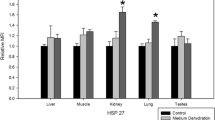Abstract.
Stress-induced heat shock protein gene expression is developmentally regulated during early embryogen esis of the frog, Xenopus laevis. For example, a number of heat shock protein genes, such as hsp70, hsp90, and ubiquitin are not heat-inducible until after the midblastula stage of embryogenesis. Furthermore, the family of small heat shock protein genes, hsp30, are differentially expressed after the midblastula stage as well as being regulated at the level of mRNA stability. Many of these stress proteins are also synthesized constitutively during oogenesis and embryogenesis during which they may act as molecular chaperones as well as being involved in sequestering proteins in an inactive state until required by the developing embryo. Furthermore the induction of these stress protein genes has been correlated with enhanced thermoresistance. During stressful conditions heat shock proteins probably prevent aggregation or misfolding of damaged protei ns within the embryo.
Similar content being viewed by others
Author information
Authors and Affiliations
Rights and permissions
About this article
Cite this article
Heikkila, J., Ohan, N., Tam, Y. et al. Heat shock protein gene expression during Xenopus development. CMLS, Cell. mol. life sci. 53, 114–121 (1997). https://doi.org/10.1007/PL00000573
Issue Date:
DOI: https://doi.org/10.1007/PL00000573



